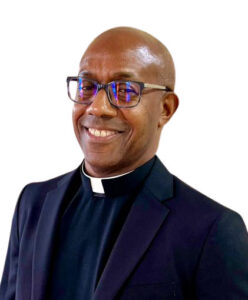Address: Langfords | Friars Hill Rd | St. John's. Antigua | Email: dsjbchancery@gmail.com | Tel: 1-268-461-1135
A Reflection on the Final Document on Synodality
By Fr. Donald Chambers, General Secretary- Antilles Episcopal Conference
 Fundamentally, synodality is a journey of prayerful discernment that involves mutual listening, dialogue, and communal discernment as the Church walks together with Christ towards the Kingdom of God. In the book *Walking Together*, Fr. Peter McIsaac states, “Discernment is simply attentiveness to and awareness of God in our prayer, our daily activities, and our diverse networks of relationships.”
Fundamentally, synodality is a journey of prayerful discernment that involves mutual listening, dialogue, and communal discernment as the Church walks together with Christ towards the Kingdom of God. In the book *Walking Together*, Fr. Peter McIsaac states, “Discernment is simply attentiveness to and awareness of God in our prayer, our daily activities, and our diverse networks of relationships.”
Throughout the three-stage journey (diocesan, regional, and universal), the Church experienced God’s grace, which was encapsulated in the various syntheses (diocesan, Antilles Episcopal Conference, and Regional) that formed the basis for the final discernment at the October 2024 Synod Assembly in Rome. At the conclusion of the Assembly, the graces were once more gathered like fruits in a Final Document. In this article, I share some of the graces from the regional Church’s discernment that are affirmed in the Final Document. This affirmation reflects the Church’s belief embodied in the term sensus fidei, that “all believers . . . possess an instinct for the truth of the Gospel.” This “instinct” was essential throughout the synodal journey.
Section two of the Final Document, “On the Boat Together – Conversion of Relationships”, mentions that the synodal journey discerned the call to develop the Church’s capacity to nurture relationships with the Lord, among ourselves, in the family, local community social groups and religions, and with all of creation. The AEC synthesis also states, “The Spirit asks us to renew our parishes to create a caring, hospitable, and non-judgmental parish family. This renewal involves welcoming, caring for and accompanying those on our margins, such as the poor, the elderly, youths, and LGBTQIA+ persons. Caring for each other is a key tenet of lived communion and the key to creating and sustaining community.” To confirm this grace, one AEC participant wrote, “Accepting the other in my life can be uncomfortable, but it is a way to become more human. The other takes me out of myself; it opens me to relationship, and God is relationship.”
Section three, “Cast the Net: Conversion of Processes,”identifies three interconnected ecclesial practices of the synodal journey: community discernment, decision-making, and a culture of transparency, accountability and evaluation through which we respond to the Word that shows us the paths of mission. In the AEC Synthesis, the people discerned that “There is a demand for co-responsibility, transparency, accountability, and updates to keep stakeholders in the loop. Thus, the laity desires participation in pastoral planning. . .”. Quoting from one AEC participant, “Increased representation in decision-making policies conjointly within the Church should be done responsibly. Every member should have a voice.”
Section four, “Abundant Catch – Conversion of Bonds”, addresses how to cultivate new forms of exchanging gifts and renew the interconnecting bonds that unite us when Church members experience dislocation due to uncontrollable external factors. It expresses the belief that “a synodal Church is grounded in bonds of communion with space for all peoples and culture. There is a need to cultivate new forms of exchanging gifts and network of bonds that unite us.”
The AEC synthesis demonstrates the regional Church’s dream: “This aspiration would require a different model of church grounded on the belief in a God who creates, redeems, and calls each of us to his/her unique vocation. Formation needs first to prepare all members of this family to answer God’s call and to accept co-responsibility for the mission to proclaim, govern and sanctify. This requires a comprehensive formation approach—not just the content of faith, but the capacity to relate with active empathic listening to God and the other. This will demand ongoing and dynamic conversion for all members of the family.”
The fifth section, “So I Send You – Forming for Missionary Discipleship,” looks at a particular movement needed to form the People of God to be synodal missionaries. The AEC Synthesis aligns with this grace. “The laity warn[s] of the danger of organizing the Church primarily on commercial principles . . . The structure and governance of the Church must be infused with spiritual foundations and language. Pre-eminence must be given to the Eucharist as “the heart of ecclesial communion,” which also provides the principles for living the Christian faith, including conversion and forgiveness. Flowing from the liturgical experience, we must form bonds and partnerships to support each other to give Christian witness in professional and socio-political life.”
The graces reflected in the Final Document align with the AEC Synthesis. Hopefully, this confirmation will inspire us to “small up yourself” and embark on the synodal bus.
